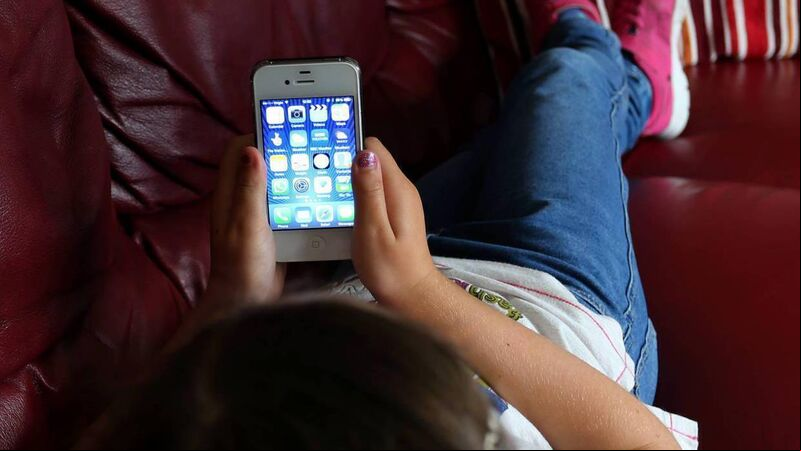We must shield children from dark side of the smartphone

Writing on social media, Paschal Donohoe explained that Jonathan Haidt’s book The Anxious Generation had a profound impact on him, saying: “While mobile phones have changed our lives in so many wonderful ways, they present many challenges, especially when it comes to our younger people.”
This €9m for phone pouches builds on Norma Foley’s ‘Keeping Childhood Smartphone Free’ initiative which encourages banning the use of mobile phones in secondary schools.
Haidt’s book discusses the ‘great rewiring of childhood’, how people born after 1995 started to spend less time with their friends and had less opportunity for unsupervised play.
The introduction of social media heralded a switch to a phone-based childhood where young people now spend more of their time on a digital device than hanging with their friends in real life.
It’s 20 years since Facebook kickstarted the social media boom and launched an untested psychosocial experiment on the world. TikTok, Instagram and Snapchat all vie for our time and eyeballs, and mounting research on the effects of social media consistently tells us there is a negative association between using a device and health, wellbeing, and learning outcomes.
As adults, we feel it ourselves with our own distracting phone usage so, of course, children and teenagers, with their still developing brains, feel it more!
However, many do not agree that spending millions on phone pouches was a “wise budgetary move”, but is instead a distraction from tackling some of the chronic issues within the education system.
The Irish National Teachers Organisation said: “It beggars belief that initiatives like this have been prioritised over the real needs of our cash-strapped schools.”
The National Youth Council of Ireland were also disappointed that funding for “youth work only received an extra €7 million in the budget” in contrast to the €9m allocated to phone pouches. Sinn Féin’s Mary Lou MacDonald said it was a “scandalous waste of public money”.
Being scandalised by wastage of public money is an occupational hazard to living in Ireland, but the government needs to balance multiple priorities. Would the allocation have received the same backlash if it had come out of a different budget?
Looking at it from a wider societal perspective. this measure sends a powerful message to young people, parents and schools that phone usage has negative impacts on children and all secondary schools must be phone-free environments.
What is really needed is a comprehensive approach to addressing online harms. This is what the national campaign ‘Gen Free: Free to be Kids’ is calling for.
An active leader in the Gen Free campaign is Cork woman Aida Whooley who, along with individuals such as psychotherapists Colman Noctor, Dr Richard Hogan, cyberpsychologist Prof. Mary Aiken and organisations such as the Irish Medical Organisation, Barnardos and CyberSafeKids, is calling on the government to regulate, educate and making the online world a safer environment for children.
At the campaign launch, Prof Matthew Sadlier, Chair of the Irish Medical Organisation Consultants Committee, said: “The radical changes in behaviour of children that we have seen since the introduction of immersive digital technology is having an overwhelming harmful effect”.
Campaigners want the laws that apply to protecting children in the real world to be applied to the online world.
Gen Free argue that since the smartphone became mainstream in 2012, there has been a documented rise in anxiety, depression, deliberate self-harm and suicide among children and young people.
A 2019 study by UCD found the number of young people suffering from anxiety in Ireland had doubled in seven years, of the 10,459 secondary school level children spoken to, 22% reported experiencing severe anxiety.
Smartphones have enabled children to view pornography and violent content. In the UK, 27 % of children have viewed pornography by age 11, 50% by age 13.
The age a child first encounters it generally correlates with the age they first receive their own device.
Teacher Eoghan Cleary wrote an eye-opening article for The Journal earlier this year about the social media use of his secondary school pupils and the types of horrific content they see online.
He asked how many of his 24 second-year students had seen someone killed in real life on social media and almost every hand in the room went up.
Last month, Minister for Health Stephen Donnelly established an Online Health Taskforce to develop a public health response to harms caused to children and young people. The establishment of the taskforce is welcome but must lead to tangible actions.
There must be regulation of big tech companies who are allowing kids to be exposed to such dark content. But expect resistance, young s are valuable to these companies. A Harvard study estimated that Meta, YouTube, TikTok, Snapchat and X made about €10 billion in 2022, in the US alone, on the back of targeted advertising to their younger s.
The cogs of regulation and legislation move slowly, but in the meantime parents still have agency to control whether their children get a phone or not.
The common reason for giving a child a phone is to avoid social exclusion. If the parents in a class or neighbourhood or friendship group have a conversation about delaying giving a smartphone or boycotting social media, it takes the peer pressure away.
If giving a child a phone means they are likely to see porn, beheadings, and other frightening content. I think we should fight hard to hold off as long as possible .







 App?
App?




